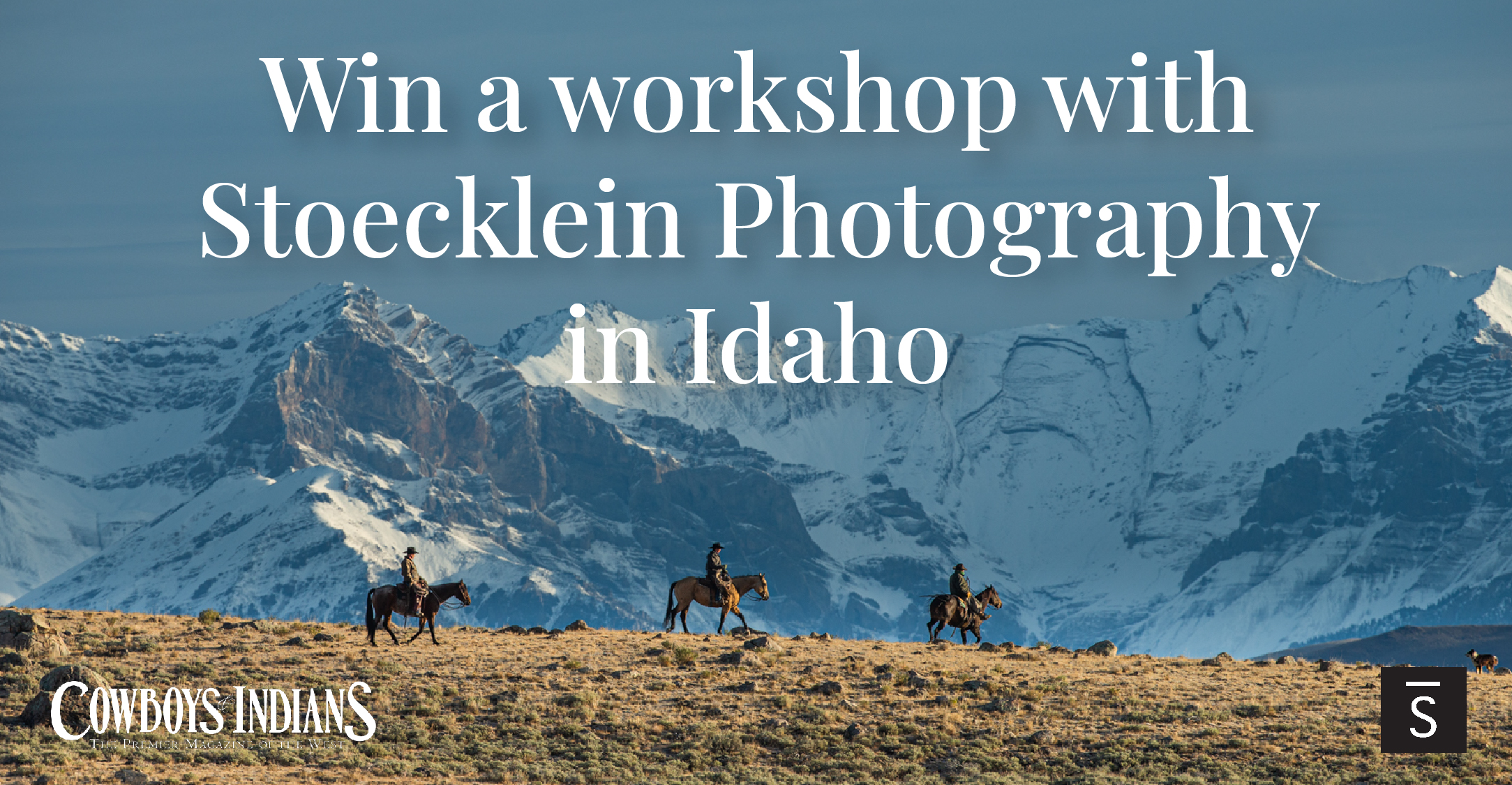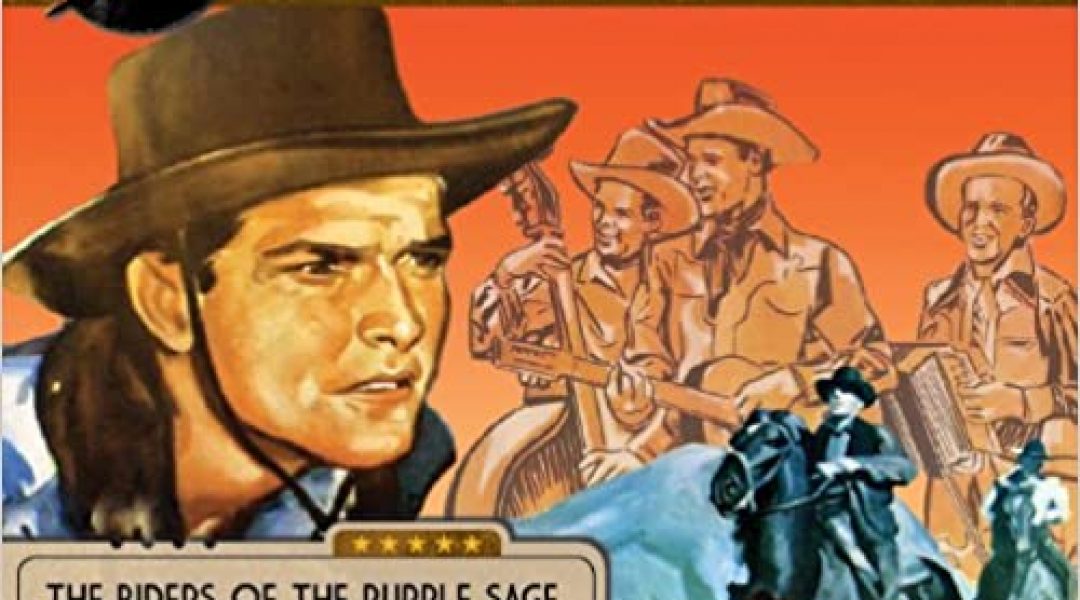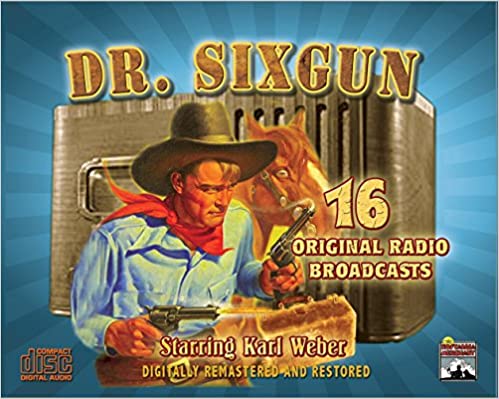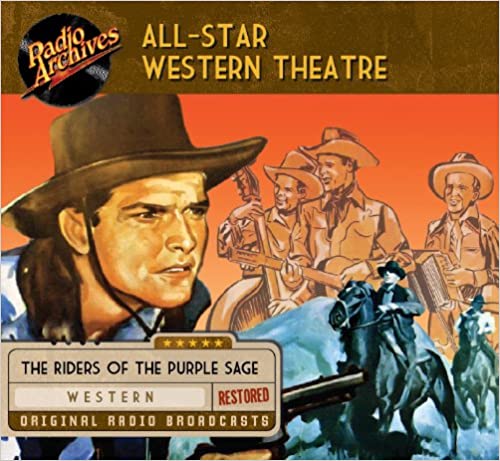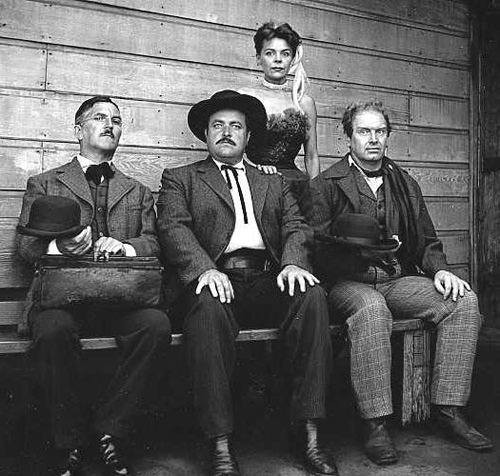You might be too young to remember gathering around the radio, but listening to old westerns is a retro-cool way to pass the time.
Drifting along, singing a song, under a western moon …
With that lyric, sung by Foy Willing and the Riders of the Purple Sage, radio audiences knew it was time for another episode of All-Star Western Theatre (1946-1948). Broadcast live from Hollywood on Sunday afternoons, the series featured music, comedy, western stories and visits from the era’s top cowboy stars and country singers.
The years of the great radio networks spanned from 1926 to 1962, with their heyday in the 1930s and ’40s. Millions of Americans would gather round the radio to laugh with Fred Allen or Jack Benny, follows the travails of soap opera heroines on Painted Dreams and The Romance of Helen Trent, or hide under the covers to escape the frightening stories on Lights Out and The Shadow.
Capitalizing on the rising popularity of western swing in the 1940s, the Riders of the Purple Sage became staples on radio, appearing with the Andrews Sisters and on Roy Rogers’ weekly series. Fans of B-westerns also recognized their cowboy crooning from several films with Rogers, Monte Hale and Charles Starrett.
During radio’s golden years, the western was the most popular movie genre, by the number of films made, if not always in box office success. The genre was not as dominant on radio, though it was certainly well-represented.
There were dramas like Dr. Sixgun, about a quick-on-the-draw frontier doctor, Tales of the Texas Rangers, Hawk Larabee (fans will remember the opening sounds of a hawk’s whistle, followed by thundering hoofbeats), and The Six Shooter, starring James Stewart.
For the kids there was The Lone Ranger, one of radio’s most famous creations, as well as The Cisco Kid, The Tom Mix Ralston Straight Shooters, the globetrotting action series Bobby Benson’s Adventures and Red Ryder, billed as “America’s famous fighting cowboy.”
And there were successful variety series such as Gene Autry’s Melody Ranch, The Roy Rogers Show, and All-Star Western Theatre. “The show’s host, Cottonseed Clark, made it big on the radio with a program that replaced Gene Autry's Melody Ranch while Gene was flying in the Army during [World War II],” said Jon Folk from the Old Time Radio Catalog website. “When Gene came back a hero he naturally restarted his radio show. Cottonseed Clark [was] too popular to cast aside, so All-Star Western Theatre was developed.”
So how do these shows hold up, nearly 70 years after they were first broadcast? Better than what might be expected. Great music is great music, and the mix of Foy Willing’s rich baritone with Al Sloey’s smooth tenor and the Riders’ backing harmonies created a soothing sound ideal for prairie love songs and trail ride anthems.
Singers like Dale Evans or Eddie Dean were frequent guests, and even the legendary Hank Williams appeared on one show. He performed the Bob Wills’ song “Miss Molly” and participated somewhat awkwardly in a comic sketch with Foy Willing. They played two men getting off a train in Western town; Foy introduces Hank to an Indian who can remember what he had for breakfast every morning of his life.
Hank asks the Indian, “What did you have on June 8, 1904?” “Had’um egg,” replies the Indian, in the politically incorrect dialect of the day. Cut to 10 years later — Hank’s character is back in town and wonders if Foy was fooling him, or if the Indian just had eggs every morning. He tracks him down. “How, Chief!” Hank says to the Indian, who replies, “Scrambled.”
If you think that’s bad, Smiley Burnette appeared in an All-Star Western Theatre story called “The Cowboy Dentist.” “I’m a real Hopalong Cavity,” quipped Burnette. The jokes rarely got better than that.
Shortly after Christmas, 1947, the series received a visit from ventriloquist Edgar Bergen. Despite the apparent absurdity of performing a ventriloquist act on a medium where no one could watch your lips not move, Bergen and his dapper dummy, Charlie McCarthy, ranked among the most popular radio performers of the era. As Bergen related a story of fierce battles he fought on the frontier, his comedic exchanges with Charlie were a high point in All-Star Western Theatre humor:
Bergen: There I was with pistols in two hands, and a shotgun in the other…
Charlie: Hey, wait a minute…
Bergen: The situation called for some clear and clever thinking.
Charlie: So you gave up?
Bergen: It was lucky I wasn’t killed.
Charlie: Better luck next time.
Bergen: My horse is just like one of my family.
Charlie: Well, you know your family better than I do.
In the 1950s, television replaced radio as the primary source for comedy, drama, and musical variety entertainment. Many of the top radio stars successfully migrated to the new medium, as did several of its most popular series, including Death Valley Days and Gunsmoke.
All-Star Western Theatre was not among those to make the transition, though it survived into the TV era through endless reruns. “Apparently there were episodes broadcast as late as 1955,” Folk said.
The Edgar Bergen episode, along with dozens more, is available on MP3 from Old-Time Radio Catalog. The company also stocks episodes from other western radio shows, including The Lone Ranger, Gunsmoke, Red Ryder, and Death Valley Days. These shows offer a nostalgic visit to a simpler time of family entertainment when no parental advisories were necessary.
More Radio Westerns
Old-Time Radio Westerns has a large selection of Western genre radio shows that originally were broadcast from the 1920s through the 1950s. It bills itself as “your source for the best old time radio westerns, including Gunsmoke, Lone Ranger, Cisco Kid, Challenge of the Yukon, Have Gun Will Travel, The Six Shooter, Tales of the Texas Rangers, Hopalong Cassidy, Fort Laramie, and more. The episodes on the site are digitally remastered and restored old-time radio westerns “from an era that is now gone.” It’s free to subscribe and download, and it’s listener-supported. Visit otrwesterns.com.
Images from Amazon and Old-Time Radio Westerns.




